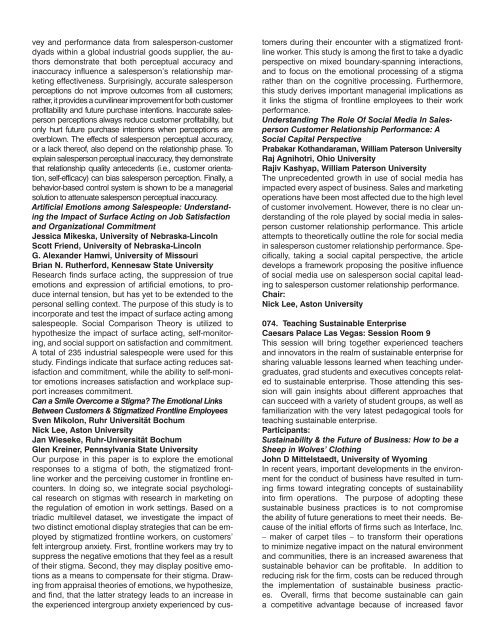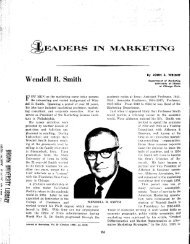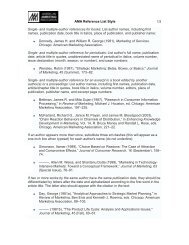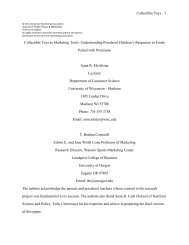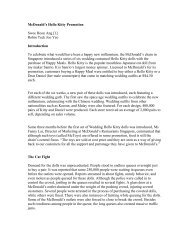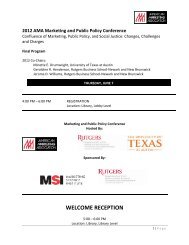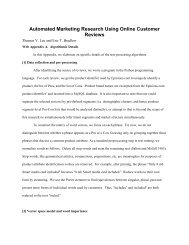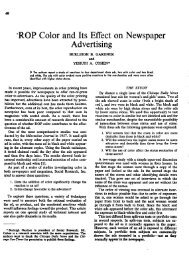Program 2013 Winter Marketing Educators' Conference Challenging ...
Program 2013 Winter Marketing Educators' Conference Challenging ...
Program 2013 Winter Marketing Educators' Conference Challenging ...
You also want an ePaper? Increase the reach of your titles
YUMPU automatically turns print PDFs into web optimized ePapers that Google loves.
vey and performance data from salesperson-customer<br />
dyads within a global industrial goods supplier, the authors<br />
demonstrate that both perceptual accuracy and<br />
inaccuracy influence a salesperson’s relationship marketing<br />
effectiveness. Surprisingly, accurate salesperson<br />
perceptions do not improve outcomes from all customers;<br />
rather, it provides a curvilinear improvement for both customer<br />
profitability and future purchase intentions. Inaccurate salesperson<br />
perceptions always reduce customer profitability, but<br />
only hurt future purchase intentions when perceptions are<br />
overblown. The effects of salesperson perceptual accuracy,<br />
or a lack thereof, also depend on the relationship phase. To<br />
explain salesperson perceptual inaccuracy, they demonstrate<br />
that relationship quality antecedents (i.e., customer orientation,<br />
self-efficacy) can bias salesperson perception. Finally, a<br />
behavior-based control system is shown to be a managerial<br />
solution to attenuate salesperson perceptual inaccuracy.<br />
Artificial Emotions among Salespeople: Understanding<br />
the Impact of Surface Acting on Job Satisfaction<br />
and Organizational Commitment<br />
Jessica Mikeska, University of Nebraska-Lincoln<br />
Scott Friend, University of Nebraska-Lincoln<br />
G. Alexander Hamwi, University of Missouri<br />
Brian N. Rutherford, Kennesaw State University<br />
Research finds surface acting, the suppression of true<br />
emotions and expression of artificial emotions, to produce<br />
internal tension, but has yet to be extended to the<br />
personal selling context. The purpose of this study is to<br />
incorporate and test the impact of surface acting among<br />
salespeople. Social Comparison Theory is utilized to<br />
hypothesize the impact of surface acting, self-monitoring,<br />
and social support on satisfaction and commitment.<br />
A total of 235 industrial salespeople were used for this<br />
study. Findings indicate that surface acting reduces satisfaction<br />
and commitment, while the ability to self-monitor<br />
emotions increases satisfaction and workplace support<br />
increases commitment.<br />
Can a Smile Overcome a Stigma? The Emotional Links<br />
Between Customers & Stigmatized Frontline Employees<br />
Sven Mikolon, Ruhr Universität Bochum<br />
Nick Lee, Aston University<br />
Jan Wieseke, Ruhr-Universität Bochum<br />
Glen Kreiner, Pennsylvania State University<br />
Our purpose in this paper is to explore the emotional<br />
responses to a stigma of both, the stigmatized frontline<br />
worker and the perceiving customer in frontline encounters.<br />
In doing so, we integrate social psychological<br />
research on stigmas with research in marketing on<br />
the regulation of emotion in work settings. Based on a<br />
triadic multilevel dataset, we investigate the impact of<br />
two distinct emotional display strategies that can be employed<br />
by stigmatized frontline workers, on customers’<br />
felt intergroup anxiety. First, frontline workers may try to<br />
suppress the negative emotions that they feel as a result<br />
of their stigma. Second, they may display positive emotions<br />
as a means to compensate for their stigma. Drawing<br />
from appraisal theories of emotions, we hypothesize,<br />
and find, that the latter strategy leads to an increase in<br />
the experienced intergroup anxiety experienced by cus-<br />
tomers during their encounter with a stigmatized frontline<br />
worker. This study is among the first to take a dyadic<br />
perspective on mixed boundary-spanning interactions,<br />
and to focus on the emotional processing of a stigma<br />
rather than on the cognitive processing. Furthermore,<br />
this study derives important managerial implications as<br />
it links the stigma of frontline employees to their work<br />
performance.<br />
Understanding The Role Of Social Media In Salesperson<br />
Customer Relationship Performance: A<br />
Social Capital Perspective<br />
Prabakar Kothandaraman, William Paterson University<br />
Raj Agnihotri, Ohio University<br />
Rajiv Kashyap, William Paterson University<br />
The unprecedented growth in use of social media has<br />
impacted every aspect of business. Sales and marketing<br />
operations have been most affected due to the high level<br />
of customer involvement. However, there is no clear understanding<br />
of the role played by social media in salesperson<br />
customer relationship performance. This article<br />
attempts to theoretically outline the role for social media<br />
in salesperson customer relationship performance. Specifically,<br />
taking a social capital perspective, the article<br />
develops a framework proposing the positive influence<br />
of social media use on salesperson social capital leading<br />
to salesperson customer relationship performance.<br />
Chair:<br />
Nick Lee, Aston University<br />
074. Teaching Sustainable Enterprise<br />
Caesars Palace Las Vegas: Session Room 9<br />
This session will bring together experienced teachers<br />
and innovators in the realm of sustainable enterprise for<br />
sharing valuable lessons learned when teaching undergraduates,<br />
grad students and executives concepts related<br />
to sustainable enterprise. Those attending this session<br />
will gain insights about different approaches that<br />
can succeed with a variety of student groups, as well as<br />
familiarization with the very latest pedagogical tools for<br />
teaching sustainable enterprise.<br />
Participants:<br />
Sustainability & the Future of Business: How to be a<br />
Sheep in Wolves’ Clothing<br />
John D Mittelstaedt, University of Wyoming<br />
In recent years, important developments in the environment<br />
for the conduct of business have resulted in turning<br />
firms toward integrating concepts of sustainability<br />
into firm operations. The purpose of adopting these<br />
sustainable business practices is to not compromise<br />
the ability of future generations to meet their needs. Because<br />
of the initial efforts of firms such as Interface, Inc.<br />
– maker of carpet tiles – to transform their operations<br />
to minimize negative impact on the natural environment<br />
and communities, there is an increased awareness that<br />
sustainable behavior can be profitable. In addition to<br />
reducing risk for the firm, costs can be reduced through<br />
the implementation of sustainable business practices.<br />
Overall, firms that become sustainable can gain<br />
a competitive advantage because of increased favor


